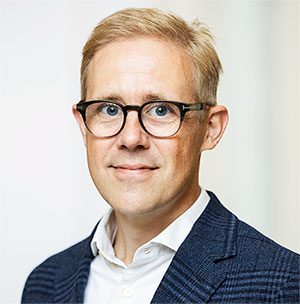Stockholm Science City has a MoU (Memorandum of understanding) with Innovation District Copenhagen and Oslo Science City. This gives us the opportunity for deeper collaboration and knowledge exchange.

Below is an interview with Andreas Blohm Graversen, Deputy Director Innovation and External Partnerships.
Tell us about Innovation District Copenhagen.
– Innovation District Copenhagen (IDC) aims to create an ideal framework for innovation that benefits society.
The IDC is a partnership between academic institutions, commercial actors and decision-makers at the national, regional and municipal levels.
Geographically, our district is two square kilometres at the heart of Copenhagen.
Everything and everyone is within walking distance, from the university hospital Rigshospitalet, University College Copenhagen (KP) and University of Copenhagen, faculties of SCIENCE and Health and Medical Sciences. In IDC you will find 40,000 researchers, students and employees, more than 500 innovation-intensive companies, six start-up environments from pre-seed to stock market listing, 10 incubator and accelerator programs and 200,000 square meters of office hotels.
The district houses excellent research in all traditional natural and health science disciplines but has a global edge in six commercially relevant fields:
- Quantum science
- Nano-science
- Metabolism and diabetes
- Protein research and bioinformatics
- Cancer research
- Bacteriology
- Algorithms and artificial intelligence
– Therefore, the district has many strengths, but we also benefit from the fact that our country is extremely business-friendly. Denmark is ranked as the most innovative country in the EU and as the EU's easiest place to both establish and run a business.
What advantages do you see in strengthening the cooperation between the three Scandinavian innovation districts?
– In Scandinavian countries, we share a strong international position in life science. Although the framework conditions in our three countries are different, we are more similar to each other than most other countries, and we already have substantial areas of cooperation within university-driven innovation, for example, with the annual Nordic Innovation Fair and the Danish/Swedish collaboration Medicon Valley. In other areas, we must be aware of how we can benefit from each other's positions of strength.With a strengthened focus on research-driven innovation from, among others, the EU Commission, it is crucial that we, in the Scandinavian countries, maintain our focus and share our insights because we can look forward to significantly increased competition from all over the world to develop leading innovation districts.
What are your main strengths that you bring to this collaboration?
– Our three academic members, the university, the hospital and the professional college, are all in the process of transforming their innovation efforts. Innovation is now central to the strategies of all three institutions. We are experiencing a greatly increased focus from both local, regional and national political teams as well as from large Danish foundations. Together with the government, we have just formulated a vision that gives us a strong starting point for creating a world-class innovation district. Especially in life science and quantum science.
Specifically, we provide access to:
- No. 2 university in the EU, University of Copenhagen (Shanghai Rankings no. 32 in 2024)
- Respectively second highest and highest level of life science publications and clinical trials per population in the EU
- Seventh highest number of quantum publications in the world! Most graduates per population have an education in quantum-related disciplines.
- Seven globally leading research fields with commercial relevance
- Ten incubator and accelerator programs. Including the life science actor BioInnovation Institute and the quantum actor Deep Tech Lab Quantum
- State-of-the-art facilities for chemical, physical and biological analysis and characterization
- Flexible office and laboratory facilities within walking distance to leading academic laboratories.
– The combination of world-leading research in both life and bio-science fields, artificial intelligence, and quantum technology provides an exciting starting point for entirely new solutions to the world's challenges regarding the health of people and the planet. An increased focus on innovation and business collaboration, together with increasingly more robust access to capital, makes Innovation District Copenhagen an attractive destination for innovation-intensive start-ups, scale-ups and research and development departments of established companies.
